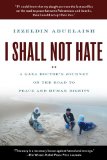Summary | Excerpt | Reviews | Beyond the Book | Read-Alikes | Genres & Themes | Author Bio
A Gaza Doctor's Journey on the Road to Peace and Human Dignity

Critics' Opinion:
Readers' Opinion:
First Published:
Jan 2011, 256 pages
Paperback:
Jan 2012, 256 pages
 Book Reviewed by:
Book Reviewed by:
Kim Kovacs
Buy This Book
This article relates to I Shall Not Hate
The Gaza Strip is the smaller of the two Palestinian territories (the West Bank being the larger). It is bordered by the Mediterranean Sea on the east, and by Egypt in the southwest, with Israel surrounding it on all other sides. It is just 25 miles long and 7.5 miles across at its widest (map). This narrow strip of land is home to approximately 1.6 million people who are mostly Sunni Muslim. While the population is highly literate (92% of residents can read), over two-thirds are considered refugees, unemployment is approximately 40% (2010), and about 70% live below the poverty line (2009).
 The area's present boundaries were formed after the 1948 Arab-Israeli War, but human settlement dates back at least 5000 years. It's been a key territory throughout the millennia and has changed hands many times. What is now Gaza City was originally a Canaanite settlement that traded agricultural goods until economic decline appears to have caused its abandonment in the 14th century BCE.
The area's present boundaries were formed after the 1948 Arab-Israeli War, but human settlement dates back at least 5000 years. It's been a key territory throughout the millennia and has changed hands many times. What is now Gaza City was originally a Canaanite settlement that traded agricultural goods until economic decline appears to have caused its abandonment in the 14th century BCE.
Soon after, it was occupied by the Egyptians who controlled Canaan (a historical name for the Levant, which consists of the lands east of the Mediterranean corresponding with modern day Israel, Palestinian territories, Lebanon and western Syria) for the next 350 years, until the Philistines (from which the word "Palestine" is derived) captured the area in the 12th century BCE.
Next came the Israelites - the Bible lists Gaza as the place where Samson was imprisoned and died (Judges 16), and the whole area as having been captured around 1000 BCE by King David (who, as Dawood or Daud, is recognized as an important prophet in the Qur'an). By the 7th century BCE, the area was part of the Assyrian Empire, then came under the control of the Egyptians, then the Persians, before falling to Alexander the Great in 332 BCE and becoming part of the Greek Empire. After this it was overrun by several countries until being incorporated into the Roman Empire in 63 BCE.
Palestine became part of the Byzantine Empire around 400 CE, at which time its Christian rulers destroyed all pagan temples in the territory; Gaza subsequently became an important starting point for Christian pilgrimages to the Holy Land. A scant 235 years later it was captured by the Arab Rashidun Caliphate and the churches were converted to mosques. The Christian Crusaders gained control in the 12th century before being routed by the Muslim leader known in the West as Saladin. The Ottoman Empire claimed the region in the 16th century and held it until its collapse at the close of World War I, at which time The League of Nations gave administrative control of Palestine to the British.
In 1947, as part of the United Nations Partition Plan, the small piece of land now known as The Gaza Strip was assigned to be part of an Arab state, but was occupied by Egypt following the 1948 Arab-Israeli War. The Egyptians held it until until 1967 when Israel invaded during the Six-Day War. After this the Gaza Strip was administered by Israel until the Oslo Accords of 1993 called for Palestinian administration.
The Gaza Strip has its own elected government but, even though official occupation ended in 2005, Israel continues to control the region's airspace and territorial waters and restricts the movement of people and goods in and out. The region's politics became considerably more complicated when the political party Hamas (an offshoot of Egypt's Muslim Brotherhood) won control of the government in 2006. Hamas, considered a terrorist group by the Quartet on the Middle East (the four entities involved in mediating the peace process: UK, USA, EU and Russia), was not recognized as Palestine's legitimate government, and thus the Quartet put a freeze on all economic aid to the Gaza Strip, which led to political disorder and economic stagnation. Infighting ensued with more than 600 Palestinians killed in factional fighting between Hamas and its political rival Fatah in 2006-2007. While Hamas remains the governing authority in the Gaza Strip, Fatah, the only internationally recognized Palestinian government, controls the West Bank.
Filed under Places, Cultures & Identities
![]() This "beyond the book article" relates to I Shall Not Hate. It originally ran in February 2011 and has been updated for the
January 2012 paperback edition.
Go to magazine.
This "beyond the book article" relates to I Shall Not Hate. It originally ran in February 2011 and has been updated for the
January 2012 paperback edition.
Go to magazine.





The Funeral Cryer by Wenyan Lu
Debut novelist Wenyan Lu brings us this witty yet profound story about one woman's midlife reawakening in contemporary rural China.
Your guide toexceptional books
BookBrowse seeks out and recommends the best in contemporary fiction and nonfiction—books that not only engage and entertain but also deepen our understanding of ourselves and the world around us.